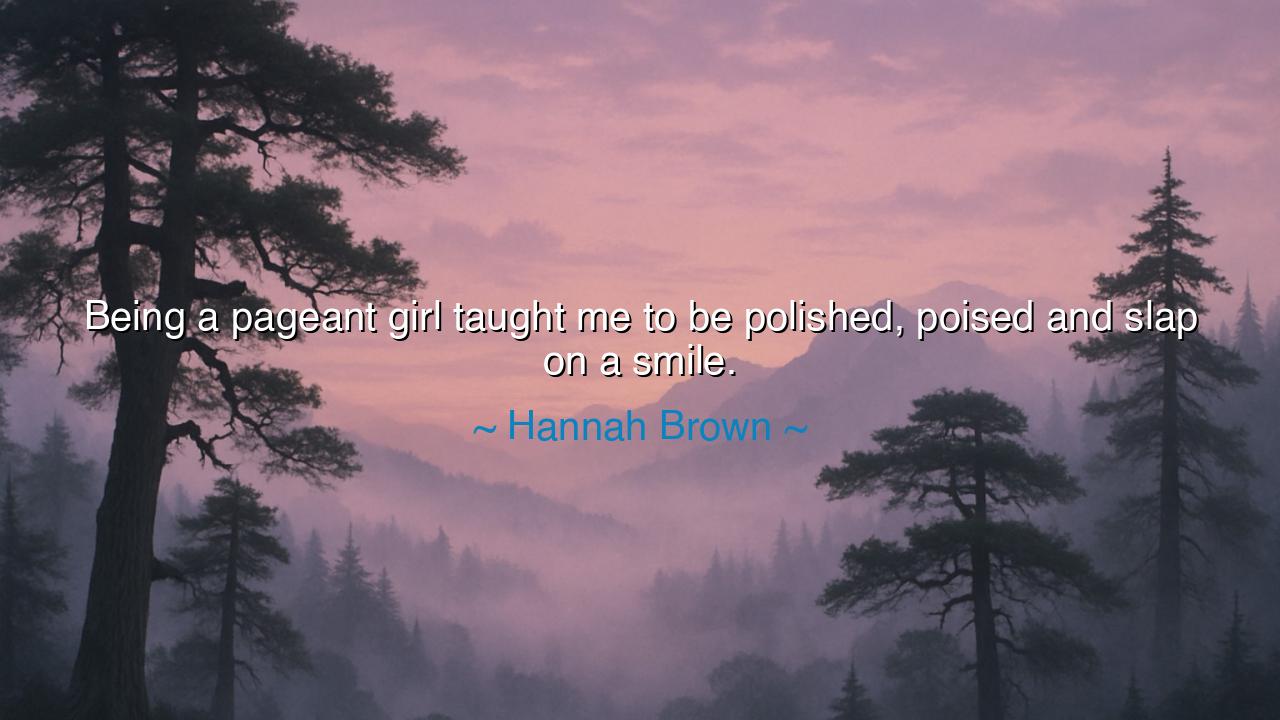
Being a pageant girl taught me to be polished, poised and slap on






Hear the words of Hannah Brown, who spoke of her journey through the glittering yet demanding world of pageantry: “Being a pageant girl taught me to be polished, poised and slap on a smile.” At first, they seem merely the musings of one shaped by contests of beauty and grace, yet within them lies a lesson as old as civilization itself: that society often trains its daughters to carry themselves with perfection, composure, and the appearance of happiness, even when the heart may be trembling within. The smile, here, is not always born of joy—it is sometimes the mask demanded by the world.
The origin of this truth is found in the traditions of pageantry, where young women are groomed to walk with elegance, to speak with poise, to dress with precision, and to face the eyes of strangers with unfaltering grace. Hannah Brown, herself a child of this world, learned what it meant to be polished—to shine with outer perfection. She learned what it meant to be poised—to stand tall even under pressure. And she learned what it meant to “slap on a smile”—to present cheer even when nerves or sorrow whispered otherwise. These are not merely skills of competition; they are reflections of how society has long shaped women to carry impossible burdens of composure.
History shows us this pattern again and again. Consider Cleopatra, queen of Egypt, who, even as her kingdom faltered under the shadow of Rome, appeared before her people adorned in majesty. Her face bore the serenity of a goddess, her demeanor unshaken, though within her spirit surely wrestled with storms. Like the pageant girl, she had been taught to be polished, to be poised, to wear the smile that reassured her people, even as fate pressed hard upon her shoulders.
Yet there is another side to this teaching. To cultivate poise, polish, and grace is not only to wear a mask—it is also to strengthen the self. The ability to stand tall when trembling, to smile when the world demands strength, to hold composure when chaos surrounds—these are not mere acts of artifice, but of resilience. In Hannah Brown’s words, one can hear both the weight of expectation and the seed of empowerment. The smile, even if “slapped on,” can become the bridge that carries the spirit through trial until true joy can be found again.
The meaning of this quote, then, is layered. It reminds us of the dual nature of appearance: it can be a cage, but it can also be armor. To be taught polish and poise is to be schooled in the art of survival in a world that judges quickly. But to rely only on the mask, never tending the inner self, is to risk losing authenticity. Hannah’s reflection carries both pride in what she gained and honesty about what she endured.
The lesson for us is clear: learn the strength of composure, but do not confuse the smile you wear for the joy within. Use polish and poise as tools to face the trials of the world, but never forget to nurture your true spirit, where authenticity and freedom dwell. A mask can protect, but it must never replace the face beneath.
Practical action must follow. When life demands that you “slap on a smile,” do so with wisdom—use it as a shield, but later, in your private moments, tend to your heart. Seek spaces and people where you need no mask, where your smiles are real. And when you see others wearing their polished masks, look deeper, offer compassion, and create a world where fewer masks are needed.
Thus the teaching is sealed: poise is strength, polish is skill, and the smile is both a mask and a light. Hannah Brown’s words remind us that the world will often ask us to perform perfection, but the truest victory lies in balancing that outward grace with inner authenticity. Let us then walk polished and poised when needed, but let us also seek to live in a world where every smile may shine from the heart, not only from the mask.






AAdministratorAdministrator
Welcome, honored guests. Please leave a comment, we will respond soon